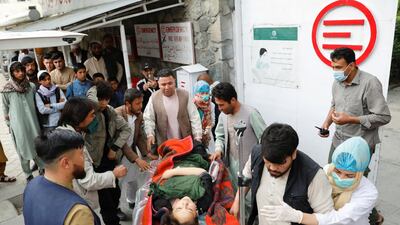The death toll from a bombing at a girls' school in Kabul has risen to 50, many of them pupils between 11 and 15 years old, Afghanistan's interior ministry said on Sunday.
The number of wounded in Saturday's attack has climbed to more than 100, and the casualty figures could still rise, ministry spokesman Tariq Arian said.
There were three explosions outside the entrance of the Sayedul Shuhada School. A car bomb detonated first in front of the school, and two more devices exploded when the pupils rushed out in panic, Mr Arian said.
No one has claimed responsibility for the bombings. Afghan President Ashraf Ghani blamed the attack on the Taliban but a spokesman for the insurgents denied involvement and said the group condemned attacks on civilians.
The blasts occurred in the Dasht-e-Barchi neighbourhood dominated by the mostly Shiite Hazara ethnic minority.
The Afghan branch of ISIS has claimed previous attacks in the area, including two bombings on education centres last year that killed 50 people, most of them students. The United States blamed ISIS for an attack last year in a maternity hospital in the same area that killed pregnant women and newborn babies.
Soon after the bombings on Saturday, angry crowds attacked ambulances and even beat health workers as they tried to take the wounded away, Health Ministry spokesman Ghulam Dastigar Nazari said.

Bloodied backpacks and school books lay strewn outside the Sayedul Shuhada School, where boys attend classes in the mornings. The blasts took place in the afternoon, when the school holds classes for girls.
“I was with my classmate, we were leaving the school, when suddenly an explosion happened, “ said 15-year-old Zahra, whose arm had been broken by a piece of shrapnel.
“Ten minutes later there was another explosion and just a couple of minutes later another explosion,” she said.
“Everyone was yelling and there was blood everywhere, and I couldn’t see anything clearly.”
Her friend died.
Outside the Muhammad Ali Jinnah Hospital in Dasht-e-Barchi, dozens of people lined up to donate blood, while family members checked casualty lists posted on the walls.
The dozens of injured taken to the Emergency Hospital for war victims were “almost all girls and young women between 12 and 20 years old”, said Marco Puntin, the hospital's programme co-ordinator in Afghanistan.
In a city rattled by relentless bombings, Saturday's attack was among the worst. Criticism has mounted over lack of security and growing fears of even more violence as the US and Nato complete their final military withdrawal from Afghanistan.
Shortly after the attack, the Emergency Hospital said there was a 21 per cent increase in war-wounded in the first three months of this year.
The attack comes days after the remaining 2,500 to 3,500 American troops officially began leaving the country. They will be out by September 11 at the latest. The pullout comes amid a resurgence by the Taliban, who control or hold sway over half of Afghanistan.







